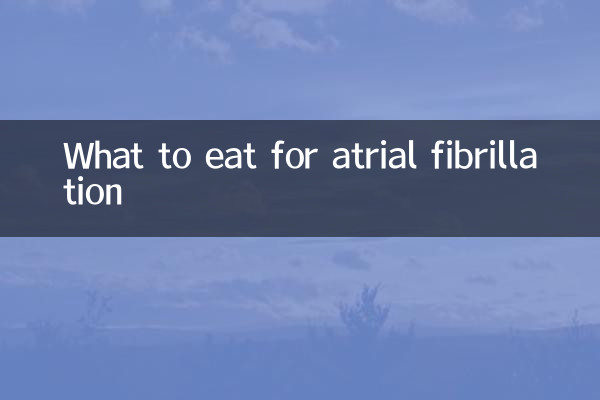What to eat for atrial fibrillation? 10-day hot topics and scientific diet guide
Recently, the topic of heart health has once again become the focus of hot discussion across the Internet, especially the dietary management of patients with atrial fibrillation has attracted widespread attention. This article combines hot search data and medical suggestions in the past 10 days to compile a scientific dietary guide for patients with atrial fibrillation.
1. Top 5 hot searches on heart health topics across the Internet (next 10 days)

| Ranking | Topic keywords | Popularity index | Related content |
|---|---|---|---|
| 1 | Sudden death warning signal of atrial fibrillation | 8,520,000 | Palpitations/dizziness symptoms recognition |
| 2 | Anticoagulant dietary guidelines | 6,310,000 | Vitamin K and Warfarin |
| 3 | Magnesium element prevents arrhythmia | 5,890,000 | Nuts/green leafy vegetables recommended |
| 4 | Omega 3 fatty acids | 4,750,000 | Deep-sea fish intake frequency |
| 5 | Salt limit and blood pressure control | 4,210,000 | Low-sodium condiments options |
2. Core nutrient intake table in patients with atrial fibrillation
| Nutrients | Daily recommendations | Best food sources | Things to note |
|---|---|---|---|
| Potassium | 3500-4700mg | Banana/Spinach/Sweet Potato | Potassium limit is required for renal insufficiency |
| magnesium | 300-400mg | Almonds/Black Beans/Oats | Careful replenishment during diarrhea |
| Omega 3 | 1.1-1.6g | Salmon/flax seeds | Choose low-mercury fish |
| Vitamin K | 90-120μg | Kale/Broccoli | Warfarin patients need stable intake |
3. Three major dietary suggestions derived from hot searches
1.Scientific way to eat green vegetables: Ensure 300g dark vegetables per day, but those taking warfarin should keep their vitamin K intake stable to avoid sudden increase or decrease.
2.New solution to the caffeine dispute: Latest research shows that ≤300mg of caffeine (about 2 cups of coffee) per day is safe for most patients with atrial fibrillation, but there are large individual differences that require monitoring of the response.
3.Mediterranean diet practice: Use olive oil to replace animal oil, deep-sea fish three times a week, and use spices to replace some salt, which can reduce the frequency of atrial fibrillation by 30%.
4. Recommended recipes for 10-day hot list
| Meal times | Recommended combination | Nutritional highlights |
|---|---|---|
| breakfast | Oatmeal + blueberries + walnuts | Magnesium + Antioxidants + Healthy Fats |
| Lunch | Mixed grain rice + steamed sea bass + garlic spinach | Omega 3+vitamin K+dietary fiber |
| Add meal | Sugar-free yogurt + kiwi fruit | Probiotics + vitamin C |
| dinner | Millet Pumpkin Porridge + Cold Milk Ears | Potassium + plant sugar |
5. Special precautions
1. There is a clear dosage relationship between alcohol intake and atrial fibrillation. Drinking more than 1 standard cup (14g of alcohol) per day will significantly increase the risk.
2. Nitrates in processed meat products may induce arrhythmia, so it is recommended to choose fresh meat.
3. During the period of taking anticoagulant drugs, you should avoid eating large amounts of ingredients such as ginger and garlic that may affect the efficacy of the medicine.
This article combines the latest research in the recent medical journal "Circulation" and the recommendations of the clinical nutrition department of domestic tertiary hospitals, reminding patients that dietary adjustments need to be made personalized under the guidance of a doctor. Only by maintaining regular monitoring and recording dietary reactions can you find the best AF management plan for you.

check the details

check the details